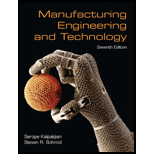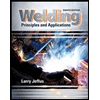
Manufacturing Engineering & Technology
7th Edition
ISBN: 9780133128741
Author: Serope Kalpakjian, Steven Schmid
Publisher: Prentice Hall
expand_more
expand_more
format_list_bulleted
Question
Chapter 30, Problem 64SDP
To determine
If you find a flaw in a welded joint during inspection, how would you go about determining whether or not the flaw is significant?
Expert Solution & Answer
Want to see the full answer?
Check out a sample textbook solution
Students have asked these similar questions
Determine the magnitudes of the reactions at the fixed support at A.
Let Hill frame H = {i-hat_r, i-hat_θ, i-hat_h} be the orbit frame of the LMO satellite. These base vectors are generally defined as:i-hat_r = r_LM / |r_LM|, i-hat_theta = i-hat_h X i-hat_r, i-hat_h = r_LM X r-dot_LMO /( | r_LM X r-dot_LMO | ) How would you: • Determine an analytic expressions for [HN]
De Moivre’s Theorem
Chapter 30 Solutions
Manufacturing Engineering & Technology
Ch. 30 - Describe fusion as it relates to welding...Ch. 30 - Explain the features of neutralizing, reducing,...Ch. 30 - What is stick welding?Ch. 30 - Explain the basic principles of arc-welding...Ch. 30 - Why is shielded metal-arc welding a commonly...Ch. 30 - What keeps the weld bead on a steel surface...Ch. 30 - Describe the functions and characteristics of...Ch. 30 - What are the similarities and differences between...Ch. 30 - What properties are useful for a shielding gas?Ch. 30 - What are the advantages to thermit welding?
Ch. 30 - Explain where the energy is obtained in...Ch. 30 - Explain how cutting takes place when an...Ch. 30 - What is the purpose of flux? Why is it not needed...Ch. 30 - What is meant by weld quality? Discuss the...Ch. 30 - How is weldability defined?Ch. 30 - Why are welding electrodes generally coated?Ch. 30 - Describe the common types of discontinuities...Ch. 30 - Prob. 18RQCh. 30 - Explain why hydrogen welding can be used to...Ch. 30 - Prob. 20RQCh. 30 - Prob. 21QLPCh. 30 - It has been noted that heat transfer in gas-metal...Ch. 30 - Explain why some joints may have to be...Ch. 30 - Describe the role of filler metals in welding.Ch. 30 - List the processes that can be performed with...Ch. 30 - What is the effect of the thermal conductivity of...Ch. 30 - Describe the differences between oxyfuel-gas...Ch. 30 - Could you use oxyfuel-gas cutting for a stack of...Ch. 30 - What are the advantages of electron-beam and...Ch. 30 - Describe the methods by which discontinuities...Ch. 30 - Explain the significance of the stiffness of the...Ch. 30 - Prob. 32QLPCh. 30 - Which of the processes described in this chapter...Ch. 30 - Prob. 34QLPCh. 30 - Prob. 35QLPCh. 30 - Comment on the factors involved in electrode...Ch. 30 - Prob. 38QLPCh. 30 - Prob. 39QLPCh. 30 - Prob. 40QLPCh. 30 - Prob. 41QLPCh. 30 - What is weld spatter? What are its sources? How...Ch. 30 - Describe your observations concerning Fig. 30.20.Ch. 30 - Prob. 44QLPCh. 30 - Plot the hardness in Fig. 30.20d as a function of...Ch. 30 - A welding operation will take place on carbon...Ch. 30 - In Fig. 30.26b, assume that most of the top...Ch. 30 - A welding operation takes place on an...Ch. 30 - An arc welding operation is taking place on carbon...Ch. 30 - Comment on workpiece size and shape limitations...Ch. 30 - Arc blow is a phenomenon where the magnetic...Ch. 30 - Review the types of welded joints shown in Fig....Ch. 30 - Comment on the design guidelines given in...Ch. 30 - Prob. 55SDPCh. 30 - Prob. 56SDPCh. 30 - Make a list of welding processes that are suitable...Ch. 30 - Prob. 58SDPCh. 30 - Prob. 59SDPCh. 30 - Review the poor and good joint designs shown...Ch. 30 - In building large ships, there is a need to weld...Ch. 30 - Prob. 62SDPCh. 30 - Comment on whether there are common factors...Ch. 30 - Prob. 64SDPCh. 30 - Lattice booms for cranes are constructed from...Ch. 30 - A common practice in repairing expensive broken...
Knowledge Booster
Learn more about
Need a deep-dive on the concept behind this application? Look no further. Learn more about this topic, mechanical-engineering and related others by exploring similar questions and additional content below.Similar questions
- hand-written solutions only, please.arrow_forwardDetermine the shear flow qqq for the given profile when the shear forces acting at the torsional center are Qy=30Q_y = 30Qy=30 kN and Qz=20Q_z = 20Qz=20 kN. Also, calculate qmaxq_{\max}qmax and τmax\tau_{\max}τmax. Given:Iy=10.5×106I_y = 10.5 \times 10^6Iy=10.5×106 mm4^44,Iz=20.8×106I_z = 20.8 \times 10^6Iz=20.8×106 mm4^44,Iyz=6×106I_{yz} = 6 \times 10^6Iyz=6×106 mm4^44. Additional parameters:αy=0.5714\alpha_y = 0.5714αy=0.5714,αz=0.2885\alpha_z = 0.2885αz=0.2885,γ=1.1974\gamma = 1.1974γ=1.1974. (Check hint: τmax\tau_{\max}τmax should be approximately 30 MPa.)arrow_forwardhand-written solutions only, please.arrow_forward
- In the bending of a U-profile beam, the load path passes through the torsional center C, causing a moment of 25 kNm at the cross-section under consideration. Additionally, the beam is subjected to an axial tensile force of 100 kN at the centroid. Determine the maximum absolute normal stress.(Check hint: approximately 350 MPa, but where?)arrow_forward### Make an introduction to a report of a rocket study project, in the OpenRocket software, where the project consists of the simulation of single-stage and two-stage rockets, estimating the values of the exhaust velocities of the engines used, as well as obtaining the graphs of "altitude", "mass ratio x t", "thrust x t" and "ψ × t".arrow_forwardA 6305 ball bearing is subjected to a steady 5000-N radial load and a 2000-N thrust load and uses a very clean lubricant throughout its life. If the inner race angular velocity is 500 rpm find The equivalent radial load the L10 life and the L50 lifearrow_forward
- Where on the below beam is the Maxiumum Slope likely to occur? C A; Атят Barrow_forwardWhat is the moment of Inertia of this body? What is Ixx, Iyy, and Izzarrow_forwardi need the The shaft is supported by a smooth thrust bearing at AA and a smooth journal bearing at BB. Draw the shear diagram for the shaft. Follow the sign convention.arrow_forward
- 4- In the system shown in the figure, the water velocity in the 12 in. diameter pipe is 8 ft/s. Determine the gage reading at position 1. Elevation 170 ft 1 Elevation 200 ft | 8 ft, 6-in.-diameter, 150 ft, 12-in.-diameter, f = 0.020 f = 0.020 A B Hints: the minor losses should consider the contraction loss at A and the expansion loss at B.arrow_forwardWhat is the moment of Inertia of this body? What is Ixx, Iyy, and Izzarrow_forwardConsider a glass window (Hight = 1.2 m, Width = 2 m). The room thatfaces the window are maintained at 25 o C. The average temperature ofthe inner surface of the window is 5 o C. Calculate the total heat transferrate from through the window a) IdenCfy what type(s) of convecCon is important (circle one). • external forced (Chapter 7)• internal forced (Chapter 8)• natural convecCon (Chapter 9)• boiling and condensaCon (Chapter 10)b) IdenCfy the necessary equaCon(s) needed to solve the problem. c) IdenCfy important fluid properCes you need to solve the problem. d) Calculate the total heat transferred.arrow_forward
arrow_back_ios
SEE MORE QUESTIONS
arrow_forward_ios
Recommended textbooks for you
 Welding: Principles and Applications (MindTap Cou...Mechanical EngineeringISBN:9781305494695Author:Larry JeffusPublisher:Cengage Learning
Welding: Principles and Applications (MindTap Cou...Mechanical EngineeringISBN:9781305494695Author:Larry JeffusPublisher:Cengage Learning

Welding: Principles and Applications (MindTap Cou...
Mechanical Engineering
ISBN:9781305494695
Author:Larry Jeffus
Publisher:Cengage Learning
Differences between Temporary Joining and Permanent Joining.; Author: Academic Gain Tutorials;https://www.youtube.com/watch?v=PTr8QZhgXyg;License: Standard Youtube License